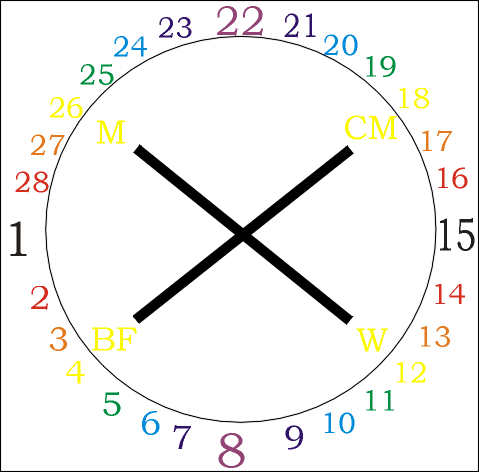
F: Self-abandonment
F: Enforced lure
12 TCM
26 TCM
| The attributes of the Faculties when Will is at Phase 12 | derived from | modified by | from | description | ||
| Will | The forerunner | 12 | ||||
| Mask | True | Self-exaggeration | 26 | CM | 4 | Beginning of the abstract supersensual |
| False | Self-abandonment | BF | 18 | The Hunchback | ||
| Creative Mind | True | Subjective philosophy | 18 | CM | 12 | Emotional philosophy |
| False | War between two forms of expression | BF | 26 | Enforced disillusionment | ||
| Body of Fate | Enforced intellectual action | 4 | ||||
| Composite of Faculties | |
|---|---|
| true | The forerunner seeks to deliver self-exaggeration, modified by the beginning of the abstract supersensual, from enforced intellectual action, with the help of subjective philosophy, modified by emotional philosophy. |
| false | The forerunner is misdirected to self-abandonment, modified by the Hunchback, because war between two forms of expression, modified by enforced disillusionment, is separated from enforced intellectual action. |
 | Attributes of Phase 12 | affects | modifies | |
| Will | The forerunner | 12 | - | |
| Mask | T:
Self-realization
F: Self-abandonment | 26 | - | |
| Creative Mind | T:
Emotional philosophy
F: Enforced lure | 18 | 4 FM 12 TCM | |
| Body of Fate | Search | 4 | 18 FM 26 TCM | |
See AV B 126-29 & 97.
Nietzsche
Yeats�s description of the phase from A Vision |
|
The man of this phase, out of phase, is always in reaction, is driven from one self-conscious pose to another, is full of hesitation; true to phase, he is a cup that remembers but its own fullness. His phase is called the 'Forerunner' because fragmentary and violent. The phases of action where the man mainly defines himself by his practical relations are finished, or finishing, and the phases where he defines himself mainly through an image of the mind begun or beginning; phases of hatred for some external fate are giving way to phases of self-hatred. It is a phase of immense energy because the Four Faculties are equidistant. The oppositions (Will and Mask, Creative Mind and Body of Fate) are balanced by the discords, and these, being equidistant between identity and opposition, are at their utmost intensity. The nature is conscious of the most extreme degree of deception, and is wrought to a frenzy of desire for truth of self. If Phase 9 had the greatest possible 'belief in its own desire', there is now the greatest possible belief in all values created by personality. It is therefore before all else the phase of the hero, of the man who overcomes himself, and so no longer needs, like Phase 10, the submission of others, or, like Phase 11, conviction of others to prove his victory. Solitude has been born at last, though solitude invaded, and hard to defend. Nor is there need any longer of the bare anatomy of Phase 11; every thought comes with sound and metaphor, and the sanity of the being is no longer from its relation to facts, but from its approximation to its own unity, and from this on we shall meet with men and women to whom facts are a dangerous narcotic or intoxicant. Facts are from the Body of Fate, and the Body of Fate is from the phase where instinct, before the complications of reflection, reached its most persuasive strength. The man is pursued by a series of accidents, which, unless he meet them antithetically, drive him into all sorts of temporary ambitions, opposed to his nature, unite him perhaps to some small protesting sect (the family or neighbourhood of Phase 4 intellectualised); and these ambitions he defends by some kind of superficial intellectual action, the pamphlet, the violent speech, the sword of the swashbuckler. He spends his life in oscillation between the violent assertion of some commonplace pose, and a dogmatism which means nothing apart from the circumstance that created it. If, however, he meets these accidents by the awakening of his antithetical being, there is a noble extravagance, an overflowing fountain of personal life. He turns towards the True Mask and having by philosophic intellect (Creative Mind) delivered it from all that is topical and temporary, announces a philosophy which is the logical expression of a mind alone with the object of its desire. The True Mask, derived from the terrible Phase 26, called the phase of the Hunchback, is the reverse of all that is emotional, being emotionally cold; not mathematical, for intellectual abstraction ceased at Phase 11, but marble pure. In the presence of the Mask, the Creative Mind has the isolation of a fountain under moonlight; yet one must always distinguish between the emotional Will - now approaching the greatest subtlety of sensitiveness, and more and more conscious of its frailty - and that which it would be, the lonely, imperturbable, proud Mask, as between the Will and its discord in the Creative Mind where is no shrinking from life. The man follows an Image, created or chosen by the Creative Mind from what Fate offers; would persecute and dominate it; and this Image wavers between the concrete and sensuous Image. It has become personal; there is now, though not so decisively as later, but one form of chosen beauty, and the sexual Image is drawn as with a diamond, and tinted those pale colours sculptors sometimes put upon a statue. Like all before Phase 15 the man is overwhelmed with the thought of his own weakness and knows of no strength but that of Image and Mask. (AV B 126-29) |
See a broader view of the Phase in the consideration of the Phase Triads.